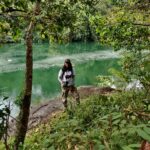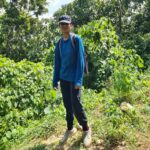Laboratorium Ekologii Behawioralnej Naczelnych
Osoby
Prof. UAM dr hab. Małgorzata Arlet
Jestem biologiem z pasją do badań zachowań społecznych z perspektywy ekologicznej i ewolucyjnej. Interesuje mnie poznawanie mechanizmów relacji społecznych u zwierząt. Moim głównym przedmiotem badań były mangabki szare w tropikalnym lesie w Ugandzie (1999-2014), nadrzewni kuzyni pawianów. U mangabek prowadziłam badania nad strategiami reprodukcyjnymi, stresem, testosteronem, pasożytami, sukcesem reprodukcyjnym samic i opieką nad potomstwem. Obserwowałam również inne gatunki małp (wolnożyjące i w zoo), goryle nizinne i delfiny. Studiowałam również komunikację u makaków japońskich i małp Campbell. Od 2016 r. prowadzę badania nad zachowaniami u makaków czepkowych w Thenmali, na południu Indii, najpierw we współpracy z Uniwersytetem Kalifornijskim w Davis, a od 2019 r. w ramach własnego grantu Harmonia (2018/30/M/NZ8/00025), jako Thenmala Macaque Project prowadzę badania dotyczące opieki nad potomstwem, rozwoju osobowości u małych makaków, a także strategii społecznych u samców.
Zainteresowania badawcze: Zachowania społeczne u naczelnych/ Ewolucja strategii społecznych / Ochrona gatunków/ Świadomość i język/ Edukacja przyrodnicza /
Współpracuję z: University of California Davis (USA), McGill University Montreal (Kanada), University of Rennes 1 (Francja), Tartu University (Estonia), Indian Institute of Science Education Research Trivandrum (Indie), Makerere University in Kampala (Uganda).
Link do strony projektu: The Thenmala Macaque Project
Instagram: The Thenmala Macaque Project
Obszar badań
Badania dotyczą zachowań socjalnych i ekologii naczelnych. Szczególna uwaga poświęcona jest zachowaniom związanym z opieką nad potomstwem i osobowością u makaków czepkowych w Indiach, oraz zachowaniom społecznym i starzeniu u mangabek siwolicych w parku Narodowym Kibale, w Ugandzie.
Tematyka badawcza
- Czynniki wpływające na osiąganie niezależności u młodych naczelnych;
- Rodzaje opieki nad potomstwem;
- Świadomość i komunikacja u naczelnych;
- Starzenie się i zdrowie u naczelnych.
Granty
2024
- Tytuł: Przyjaciel czy wróg? Relacje społeczne samców makaków czepkowych w Indiach
- Kierownik projektu: mgr Ashvita Anand
- Opiekun naukowy: prof. UAM. Małgorzata Arlet
- Konkurs: PRELUDIUM, Narodowe Centrum Nauki
- Numer projektu: 2023/49/N/NZ8/01434
- Okres realizacji: 2024-2026
- Przyznane środki: 210 000 PLN
2019
- Tytuł: Wpływ osobowości matki i matczynej opieki na rozwój osobowości dziecka w pierwszym roku życia u wolnożyjących makaków czepkowych w południowych Indiach.
- Kierownik projektu: prof. UAM dr hab. Malgorzata Arlet
- Konkurs: HARMONIA 10, Narodowe Centrum Nauki
- Numer projektu: 2018/30/M/NZ8/00025
- Okres realizacji: 2019-2023
- Przyznane środki: 547 820 PLN
- Strona projektu: NCN
Publikacje
Arlet ME, Anand A, Saikia A, Kaasik A, Sirigeri S, Isbell LA, Singh M. 2023. Behavior of Mothers after Infant Loss in Bonnet Macaques (Macaca radiata). International Journal of Primatology, 1-18.
AnandA, Balakrishna N, Singh M, Isbell LA, Sirigeri S, Saikia A, Arlet ME. 2022. Infant adoptions in wild bonnet macaques (Macaca radiata). Primates 63, 627-635
Balasubramaniam KN, Aiempichitkijkarn N, Kaburu SS, Marty PR, Beisner BA, Bliss-Moreau E, Arlet ME, Atwill E, McCowan B. 2022. Impact of joint interactions with humans and social interactions with conspecifics on the risk of zooanthroponotic outbreaks among wildlife populations. Scientific reports 12, 1-13.
Balasubramaniam K, Kaburu, S, Marty P, Beisner B, Bliss-Moreau E, Arlet ME, Ruppert N, Ismail A, Anuar Mohd Sah S, Mohan L, Rattan S, Kodandaramaiah U, McCowan B. 2021. Implementing social network analysis to understand the socio-ecology of wildlife co-occurrence and joint interactions with humans in anthropogenic environments. Journal of Animal Ecology 90, 2819-2833.
Arlet ME, Balasubramaniam KN, SahaR, Beisner B, Marty PR, Kaburu SSK, Bliss-MoreauE, Kaasik A, Kodandaramaiah U,McCowan B. 2021.Infant survival among free-living bonnet macaques (Macaca radiata) in South India. International Journal of Primatology 42, 220-236.
Balasubramaniam KN, Marty PR, Samartino S, Sobrino A, Saha R, Gill T, Ismail M, Beisner BA, Kaburu SSK, Bliss-Moreau E, Arlet ME, Ruppert N, Ismail A, Sah SAM, Mohan L, Rattan S, Kodandaramaiah U, McCowan B. 2020. Impact of individual demographic and social factors on human-wildlife interactions: a comparative study of three macaque species. Scientific Reports 10, 1-16
Balasubramaniam KN, Marty PR, Arlet ME, Beisner BA, Kaburu SSK, Bliss-Moreau E, Kodandaramaiah U, McCowan B. 2020. Impact of anthropogenic factors on affiliative behaviors among bonnet macaques. American Journal of Physical Anthropology 174, 704-717.
Marty PR, Balasubramaniam KN, Kaburu SSK, Hubbard J, Beisner B, Bliss-Moreau E, Ruppert N, Arlet ME, Sah SAM, Ismail A, Mohan L, Rattan SK, Kodandaramaiah U, McCowan B. 2020. Individuals in urban dwelling primate species face unequal benefits associated with living in an anthropogenic environment. Primates 61, 249-255
Kaburu, S. S., Beisner, B., Balasubramaniam, K. N., Marty, P. R., Bliss-Moreauc, E., Mohane, L., Arlet ME & McCowan, B. (2019). Interactions with humans reduce resting and grooming time in commensal rhesus macaques (Macaca mulatta). Folia Primatol, 91, 240-363.
Marty P, Beisner B, Kaburu SSK, Balasubramaniam K, Bliss-Moreau E, Ruppert N, Sah S, Ahmad I, Arlet ME, Atwill ER, McCowan B. 2019. Time constraints and stress imposed by human presence alter social behaviour in urban long-tailed macaques. Animal Behavior 150, 157-165.
Kaburu SS, Beisner B, Balasubramaniam KN, Marty PR, Bliss-Moreau E, Mohan L, Arlet ME, Atwill ER, McCowan B. 2019. Interactions with humans impose time constraints on urban-dwelling rhesus macaques (Macaca mulatta). Behaviour 156, 1255-1282
Arlet ME, Veromann-Jürgenson LL, Isbell LA, Mänd R, Lemasson A. 2019. Maternal care in free-ranging arboreal grey-cheeked mangabeys (Lophocebus albigena johnstoni) in Kibale National Park, Uganda. Folia Primatologica 90, 441–455.
Coye C, Ouattama K, Arlet ME, Lemasson A, Zuberbűhler K. 2018. Flexible use of simple and combined calls in female Campbell’s monkeys. Animal Behavior 141, 171-18.
Arlet ME, Veromann LL, Mänd R, Lemasson A. 2016. Call rates of mothers change with social experience and with infant characteristics in free-ranging gray-cheeked mangabeys. Am J Primatol, 78, 983-991.
Lemasson A, Jubin R, Masataka N, Arlet ME. 2016. Copying hierarchical leaders’ voices : acoustic plasticity in female Japanese macaques. Scientific Reports 6, 21289.
Arlet ME, Jubin R, Masataka N, Lemasson A. 2015. Grooming-at-a-distance by exchanging calls in nonhuman primates. Biology Letters 11, 20150711.
Arlet ME, Chapman CA, Isbell LA, Molleman F, Mänd R, Hõrak P, Carey JR. 2015. Social and ecological correlates of parasitic infections in adult male gray-cheeked mangabeys. International Journal of Primatology 36, 967-986.
Arlet ME, Isbell LA, Kaasik A, Molleman F, Chancellor RL, Chapman CA, Mänd R, Carey JR. 2015. Determinants of reproductive success in female gray-cheeked mangabeys in Kibale National Park, Uganda. International Journal of Primatology 36, 55-73.
Arlet ME, Molleman F, Isbell LA, Kaasik A, Chancellor RL, Chapman CA, Mänd R, Carey JR. 2014. Maternal investment and infant survival in gray-cheeked mangabeys. International Journal of Primatology 35, 476-490.
Arlet ME, Molleman F, Isbell LA, Chancellor RL, Carey JR, Mänd R. 2013. Correlations between social context and fecal glucocorticoid metabolite concentrations in free-ranging female gray-cheeked mangabeys in Kibale National Park, Uganda. Folia Biologica 61, 239-246.
Arlet ME, Kaasik A, Molleman F, Isbell LA, Carey JR, Mand R. 2011. Social factors increase fecal testosterone levels in wild male gray-cheeked mangabeys. Hormes and Behavior 59, 605-611.
Arlet ME, Molleman F. 2010. Farmers’ perceptions of the impact of wildlife on small-scale cacao cultivation at the northern periphery of Dja Reserve, Cameroon. African Primates 7, 27-34.
Arlet ME, Isbell LA. 2009. Variation in behavioral and hormonal responses of adult male grey-cheeked mangabeys to crowned eagles in Kibale, Uganda. Behavioral Ecology and Sociobiology 63, 491-499.
Arlet ME, Grote MN, Isbell LA, Molleman F, Carey JR. 2009. Reproductive tactics influence cortisol levels in individual male grey-cheeked mangabeys. Hormones and Behavior 55, 210-216.
Arlet ME, Carey JR, Molleman F. 2009. Species and sex differences in type and frequencies of injuries and impairments among four arboreal primate species in Kibale National Park, Uganda. Primates 50, 65-73.
Janmaat KR, Olupot W, Chancellor RL, Arlet ME, Waser PM. 2009. Long-term site fidelity and individual home range shifts in grey-cheeked mangabeys. International Journal of Primatology 30, 443-466.
Molleman F, Ding J, Boggs C, Carey JR, Arlet ME. 2009 Does dietary restriction reduce life span in male fruit-feeding butterflies? Experimental Gerontology, 44, 601-606.
Arlet ME, Molleman F, Chapman CA. 2008. Mating tactics in male grey-cheeked mangabeys (Lophocebus albigena). Ethology 114, 841-852.
Arlet ME, Molleman F. 2007. Rodents damage crops more than wildlife in subsistence agriculture on the northern periphery of Dja, Cameroon. International Journal of Pest Management 53, 237-243.
Arlet ME, Molleman F, Chapman CA. 2007. Indications for female mate choice in grey-cheeked mangabeys in Kibale National Park, Uganda. Acta Ethologica 10, 89-95.
Arlet ME. 2001. How are primates solving their conflicts in the group? Zmiennośc Biologiczna Człowieka 7, 3-11.
Arlet ME. 2001. Fluctuations of aggressive behaviour in mandrill (Mandrillus sphinx) population in Chorzów Zoo. Zmiennośc Biologiczna Człowieka 7, 13-25.
Book chapters: 4 species of Lophocebus in: Primates of the World. 2017. N. Rowe and M. Myers (eds).
 Instytut Biologii i Ewolucji Człowieka, Wydział Biologii, Uniwersytet im. Adama Mickiewicza w Poznaniu
Instytut Biologii i Ewolucji Człowieka, Wydział Biologii, Uniwersytet im. Adama Mickiewicza w Poznaniu 



